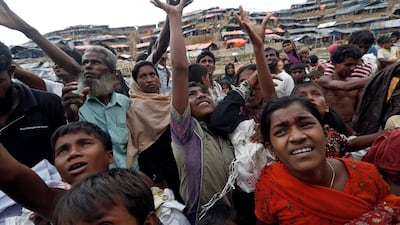An emergency foreign ministers meeting on Monday at the United Nations General Assembly came under intense pressure to produce a far tougher international response to the military-led purges of Myanmar’s Rohingya population.
Boris Johnson, the British foreign secretary, convened the closed-door summit of leading nations and regional parties at the UN after rising criticism that the Security Council was not addressing the crisis. The Organisation of Islamic Cooperation has separately scheduled a contact group summit on the Rohingya on Tuesday.
The British-organised meeting was attended by a representative from Myanmar and by foreign ministers from "a range of countries with a strong interest in seeing an end to the violence there", a spokesman said.
Mr Johnson last week called on Aung San Suu Kyi to use her “moral capital” to end the gross abuses in Rakhine state. “I think it's now vital for her to use that moral capital and that authority to make the point about the suffering of the people of Rakhine,” he said.
_________________________________
Read more:
The Rohingya: a tragedy decades in the making
Bangladesh begins drive to force Rohingya into one giant camp
Amnesty report reveals Myanmar's horrific persecution of Rohingya
_________________________________
Antonio Guterres, the UN secretary general, issued a stark warning to the Nobel laureate and de facto Myanmar leader, saying she faced a last chance to stop the atrocities.
"If she does not reverse the situation now, then I think the tragedy will be absolutely horrible, and unfortunately then I don't see how this can be reversed in the future."
Mr Guterres has been critical of the Security Council despite last week’s unified statement condemning the violence that has forced more than 400,000 to flee to neighbouring Bangladesh.
“I visited this area and I could witness the Rohingya were the most discriminated ethnic group in the world,” he said, recalling his role as the UN’s refugee chief before promotion to the top job at the start of the year.
“The Security Council has issued a statement but not yet done what I would like.
“This [military] action has to stop. We must open the right of those people who have fled to return and to establish rules for these people who are stateless.”
Aung San Suu Kyi cancelled her trip to New York when it was clear she would face pressure to use her position to stop the security action. Instead, she plans to make a speech at home in Myanmar to address the criticism.
Famous backers of the former political prisoner, including the actress Angelina Jolie, have demanded she lives up to her reputation as a champion for human rights.
"It's absolutely clear that the violence by the army needs to stop and that the return of the refugees has to be permitted and that the Rohingya should be given civil rights," Jolie told a German newspaper. "We all wish that Aung San Suu Kyi will in this situation be the voice of human rights.”
More than 400,000 signed a change.org petition for her to be stripped of the Nobel Prize and Justin Trudeau, Canada’s prime minister, is under pressure to revoke her honorary Canadian citizenship.
Sheikh Hasina, the Bangladesh prime minister, will use her trip to New York to demand more help and greater outside intervention to contain the crisis. “We want peace; we want good relations with our neighbouring countries,” she said. “But we can’t tolerate and accept any injustice.”
The prospect of imposing sanctions on Myanmar for the crackdown still appears remote. Western nations, including European Union states and the US, reversed sanctions on the Myanmar regime in 2012 after it freed Aundg San Suu Kyi and allow free elections. Those elections swept her party into power, but under a constitution that allows the military free rein to conduct its own policies.
Human Rights Watch on Monday called for a partial arms embargo and targeted sanctions against the Myanmar military and government. It said the sanctions should be imposed as a response both to the attacks by the Arakan Rohingya Salvation Army, as well as the Myanmar military's involvement in mass arson, killing and looting, destroying hundreds of villages.
While last week’s Security Council statement on Myanmar was the first in nine years, it was substantially watered down. China intervened to scrub language proposed by Egypt offering the Rohingya refugees the right to return to Myanmar.
Diplomats meeting in New York face a two-fold crisis. Activists have demanded a ramped-up response to the refugee outflow, in particular to Sheikh Hasina’s call for more assistance.
“The international community must carefully consider the longer-term implications for Rohingya women, men and children forced to flee if the Myanmar army’s violence and repression is not swiftly brought to an end,” said Kate Allen of Amnesty International. “Expecting the country to host indefinitely such a rapidly growing refugee population risks undermining its will and capacity to do so, particularly if others in the international community are not prepared to play their part.”


